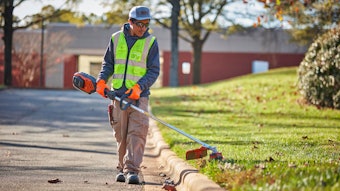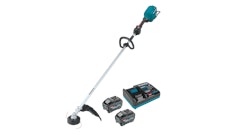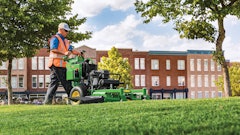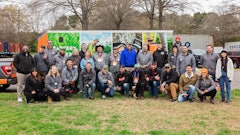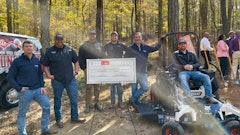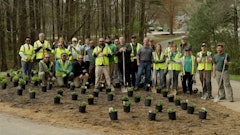
Special Gardens Inc.
Redwood City, CA
specialgardensinc.com
Founded: 1976, current ownership since 2003
Owners: Maia Highsmith and Gabriel Lopez
Employees: 34
Business Breakdown: 90% maintenance,
10% landscaping
Customer Mix: 100% residential
Fleet includes Honda 21-inch walk mowers, Exmark 36-inch walk mowers, Shindaiwa string trimmers,
RedMax debris blowers, 14 trucks
including a dump truck
What's so special about this landscape company located in Redwood City, CA? Perhaps nothing at first glance. But when you delve inside the organization—read its mission statement, talk to its employees and witness the precise manner in which the entire team plans and executes—you quickly see what makes this landscape maintenance company unique.
In fact, Special Gardens Inc. was pretty special some 30 years ago when it was first building its name. Because the company was owned and operated by two women, a perception developed that Special Gardens would pay more attention to detail, be more responsive, and generally deliver a better service than many of the other maintenance contractors in the area. Gender aside, the work of those two owners and their crews spoke for itself.
Now owned by partners Maia Highsmith and Gabriel Lopez, Special Gardens Inc. is an established brand name in the Bay Area. Still, the duo has its work cut out for them.
The affluent clientele in the San Francisco Bay Area are becoming increasingly more knowledgeable with regard to landscape practices. Competition—for both work and employees—is increasingly fierce. In other words, the market demands more, and it's harder to get and keep good employees who can uphold the company's stellar reputation.
IT'S ALL IN THE DETAILS
Highsmith and Lopez have paid their dues as crew workers for other landscape companies over the years. Highsmith is a CLT in landscape maintenance, while Lopez is a CLT in maintenance, installation and irrigation. There's nothing more important, the partners concur, than continuous education and becoming certified. That's why they encourage their employees to also become certified—and even offer to pay for the exam. "One of our crew leaders, Oscar, is certified in maintenance," Highsmith points out. "Jose, one of our other leaders, is certified in both maintenance and irrigation."
Highsmith and Lopez took over the company in 2003. "A lot has changed in the past five years," Lopez says. "For one, you have to pay your people more in order to keep them. You need to protect your investment in employees so you can maintain quality and meet the demands of the high-end residential market."
The market Special Gardens caters to on the Peninsula is a bit unique. Estates not only have lush lawns, but also expansive gardens full of annuals, perennials, trees and shrubs. Maintaining these high-end properties is labor-intensive, to say the least. More importantly, it requires a meticulous attention to detail."
Hand pruning is a craft," Highsmith points out. "Traditional lawn maintenance services are also a key part of the overall package we sell. We also do sprinkler systems, planting, deep-root fertilizing and custom-made lawn and plant fertilizers."
PRACTICE MAKES PERFECT
ust like with hand pruning, the staff at Special Gardens is very meticulous with mowers, trimmers and blowers. "It's how our crews approach every property," Lopez says. "That's why an employee base that takes pride in its work and is continually learning and growing is so important."
Training is an integral part of the Special Gardens culture and sales message. "We have about 45 minutes of training every week," Highsmith relates. "In addition, we have a few all-day, on-site training sessions throughout the year."
The on-site sessions allow employees to acquire knowledge by addressing real life challenges as they are happening in the field. Training topics include working with chemicals, measuring lawn areas, pruning, plant identification, equipment operation, detailing, irrigation, filling out paperwork, team communication and customer care.
Back at the shop, a series of training initiatives are ongoing. Most sessions take place first thing in the morning before crews depart to the field. Some of the usual topics are covered, including safety, first aid and proper equipment operation. Handouts are provided in both English and Spanish.
On that note, Special Gardens has also started providing classes to help employees improve their English. Obviously, words and phrases that will improve jobsite communication are covered. However, the primary purpose of these workshops is to help employees learn better English in general to make their lives easier.
The training doesn't stop there, though. The Plant of the Week program helps employees improve their plant identification skills, and also gain a better understanding of how to care for different kinds of plants. Safer and more efficient pruning procedures are also frequently discussed, as well as safe spraying application for plants and trees.
Similarly,
ongoing training at Special Gardens includes discussions on the safe use and storage of chemicals.
Thorough irrigation training in both English and Spanish is also offered. Detailed maintenance
processes are also taught:
• Things to do when patrolling a property before maintenance work begins
• Mower and string trimmer operation
• Proper edging techniques with special considerations for sprinkler heads
• Safe and courteous debris blower operation
• Things to do when patrolling a garden area (before and after work is complete)
PUTTING IT TO THE TEST
Lopez and Highsmith agree that employees are always very appreciative of the extensive training they receive at Special Gardens, particularly the all-day, on-site sessions. "Employees take more pride in their jobs when they have more knowledge and skill, and nothing conveys that importance more than investing in their education," Highsmith says.
To take training and pride to the next level, Special Gardens administers written tests on a regular basis. Testing allows employees to show what they've learned and earn some positive recognition. On the other hand, the tests can also point out shortfalls in an individual's training. Whatever the case, nobody skates through training without understanding the information and procedures so they can improve their performance. The tests aren't a way to catch slackers or embarrass people. The are about helping individuals learn and grow so the team as a whole can improve.
Another way Special Gardens encourages stronger team performance is by cross-training. Hand pruning specialists also operate equipment, and vice versa. "The meticulous attention to detail required in hand pruning carries over when that person is mowing or trimming," Lopez points out.
Job titles play an important role at Special Gardens as well. "We have Project Managers who manage maintenance accounts, and Lead Gardeners who run the crews," Highsmith says. "We then like to call our workers 'Assistant Gardeners' so they feel like they play a more important role in the process—because they do."
This is perhaps the biggest reason Special Gardens has had good luck keeping employees over the years. Some have even left the company, only to return later. Investing in their education helps Highsmith and Lopez show employees that they are part of something special. When everything comes together in the end, customers realize it, too.
Making a Partnership Work
Gabriel Lopez and Maia Highsmith each worked for different landscape companies before teaming
up in 1999. The two met while servicing adjacent properties one
summer.
Lopez actually worked for Special Gardens, while Highsmith worked for another area company. Lopez eventually recruited Highsmith to come work for Special Gardens, and in 2003 the two bought the company from the founding owners and became partners.
They agree that the key to making a partnership work is having talents that complement one another. Each has something he or she focuses on, so they aren't always stepping on each other's toes or duplicating efforts. At the same time, both share a commitment to training and development, and have a keen understanding of what really makes a landscape maintenance company successful: good people with pride in what they do.



